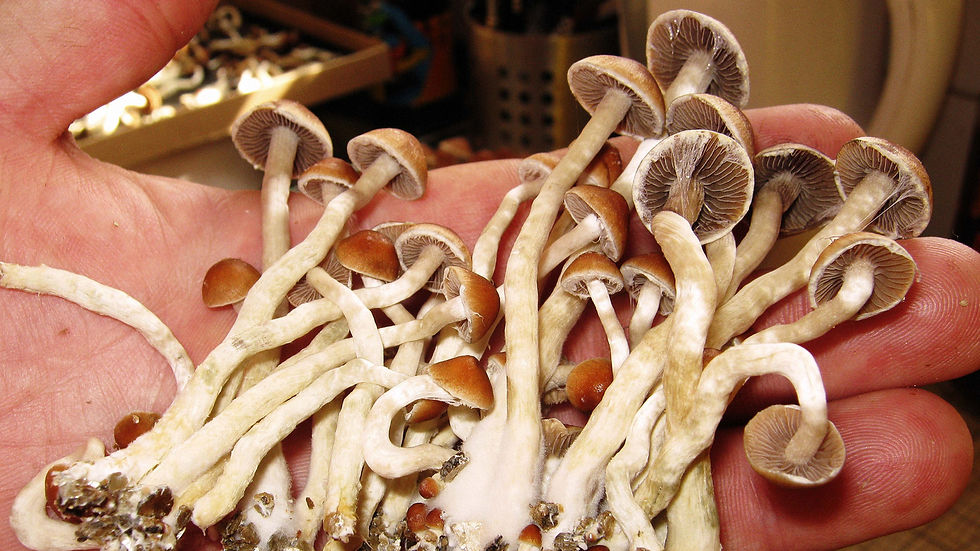Herbs for Grief: Plant Allies for the Tender Threshold
- Dave

- Jul 23, 2025
- 4 min read
If you are moving through loss of a person, a place, a phase, or a sense of self plants can offer quiet companionship. Not to take the pain away, but to walk with you as you feel it fully. These herbs are for grief.

Grief Is a Passage, Not a Symptom
Grief is not linear. It doesn’t arrive on schedule or move in stages. It surges, recedes, curls in on itself. It is as physical as it is emotional chest tight, breath shallow, stomach clenched, dreams fractured.
In many traditional cultures, grief is seen not as a wound to heal but a threshold to cross. A sacred, destabilizing journey that asks for patience, presence and tending.
And while no herb can erase what was lost, many plants know how to sit quietly beside us. They help soften the tension, invite the tears, regulate the overwhelm. Some work gently on the heart. Some steady the nervous system. Others open the gates of spirit, allowing us to feel connected to what has gone and what still lives.
How Herbs Support Grief
Plant medicine doesn’t numb the pain it teaches us how to be with it. Different herbs offer different kinds of support:
Nervine herbs ground and regulate the nervous system
Heart tonics help hold the weight of emotional pain
Lung herbs open the chest and support the breath
Spiritual allies offer deeper perspective, remembrance and release
These are not quick fixes. They are companions for the slow work of feeling, remembering, integrating.
Elderflower — A Light in the Dark
Elderflower is one of the most cherished herbs for grief. Soft, floral and sun-touched, it offers lightness without bypass, comfort without numbing. In European folk traditions, elder was seen as a tree of the dead and the living — a guardian of thresholds.
The flowers gently open the chest and sinuses, helping emotions move. They soften emotional shock and soothe the heat that often follows deep loss. Elderflower is especially helpful for those who feel heavy, foggy, or unable to cry.
Drink it as tea, infuse it in honey, or simply sit with the blossoms and breathe. Elderflower reminds us that light can return, slowly, in time.

Psilocybin — A Teacher for the Soul
For some, psilocybin in a safe, ceremonial or therapeutic context — can offer profound support in the grieving process.
These sacred fungi do not suppress grief. Instead, they amplify presence, reveal connection, and help the heart remember that love does not end with death. Under psilocybin, many people report a sense of reunion — with the lost, with the self, with something larger than either.
Psilocybin can be particularly helpful in navigating complex or long-held grief when the body knows it's time to release, but the mind resists. It helps soften the boundary between the seen and unseen, allowing space for healing, remembrance, and sometimes, peace.
If you feel called to explore this path, I offer psilocybin ceremonies in the Netherlands, held in a safe, grounded, and heart-centered way. You can learn more at
Other Herbs That Hold Grief Gently
Rose (Rosa damascena)Rose softens the ache of heartbreak and invites emotional release. It cools the heat of anger, soothes raw edges, and restores a sense of self-worth when loss has shaken your identity. Rose is both gentle and fierce a true heart ally.
Linden (Tilia spp.)A calming and heart-protective herb often used for insomnia, tension and emotional fragility. Linden helps when the grief is quiet but heavy like a persistent ache you can’t name.
Skullcap (Scutellaria lateriflora)A grounding nervine for those who feel frayed, sleepless or overwhelmed. Skullcap gently unwinds the tension that accumulates in the body after long nights of crying or anxious thought loops.
Mullein (Verbascum thapsus)Supports the lungs, where grief often takes root. Mullein is helpful when you feel like you can’t breathe fully physically or emotionally. It soothes grief that has become stuck in the body.
Motherwort (Leonurus cardiaca)A strong and slightly bitter herb that supports the physical heart and the spiritual heart. It’s helpful for sudden loss, shock, or when the body feels unsafe. Motherwort is not sweet, but it is steady.
Hawthorn (Crataegus monogyna)A heart protector and blood nourisher. Hawthorn is a slow builder a plant to take over time to strengthen emotional resilience and reconnect to the pulse of life.
How to Create a Grief Tea Ritual
Ritual is how we give the body a rhythm — when the rest of life has fallen apart. This tea is a simple invitation to return to the breath, to presence, to softness.

Grief Support Tea Recipe
You’ll need:
1 part elderflower
1 part linden
½ part rose petals
½ part skullcap
Optional: a pinch of mullein or a few hawthorn berries
Instructions:
Combine herbs in a jar and store out of direct sunlight
Use 1–2 tsp per cup of water
Steep in just-boiled water for 10–15 minutes, covered
Sip slowly, perhaps with a hand on your heart or chest
Drink once or twice daily, especially at dusk or before bed
You may wish to light a candle, speak a name, or let tears come. Grief often needs warmth, not advice.
Final Thoughts — Grief as Medicine
Grief is not weakness. It is not something to fix. It is an expression of love, of presence, of deep care. And like all sacred expressions, it deserves to be witnessed, not rushed.
Herbs will not take your grief away but they will sit with you. They will hold you when the rest of the world moves too quickly. They will whisper that you are not alone, and that in this aching, something new is also being born.
Let the plants walk beside you. Let them remind you how to feel, how to rest, and how to begin again.



